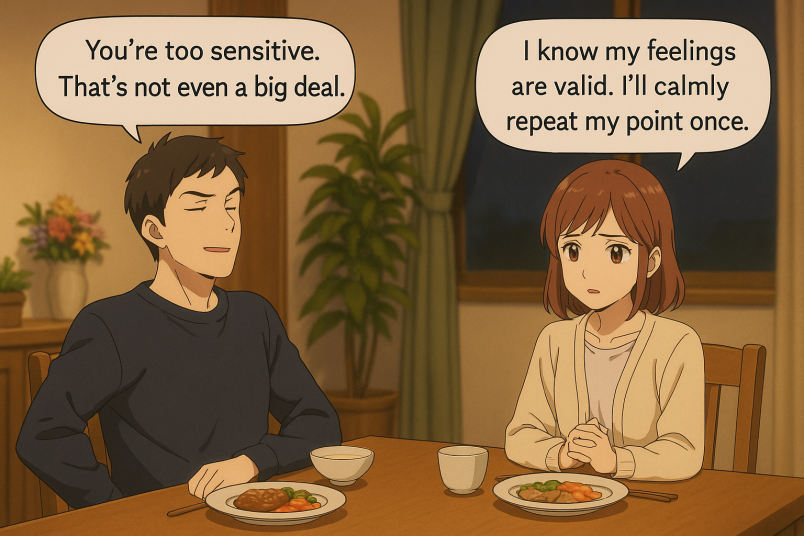How to Talk to a Narcissist: 9 Smart Ways to Handle Conversations

Heal & Grow Daily for a Happier Relationship
Subscribe FREEKey Takeaways
Marriage.com AI Quick Summary
Talking to someone who constantly craves attention can feel overwhelming, right?
One moment, they’re charming and magnetic; the next, it’s as if you’re walking on eggshells.
You might find yourself second-guessing your words, wondering, “Did I say too much?” or “Am I being misunderstood?”
It’s exhausting when conversations seem to revolve around them, leaving little room for your own thoughts. Still, there are ways to stay calm, grounded, and even confident in these moments.
Understanding how to talk to a narcissist isn’t about changing who they are; it’s about learning how you can respond with clarity, protect your energy, and communicate in a way that feels steady—even when the dialogue feels one-sided.
What does it mean to talk to a narcissist?
Talking to a narcissist often feels different from a regular conversation. They might dominate the discussion, shift topics when it doesn’t suit them, or react strongly to even gentle criticism. At times, it may seem like they hear you, yet somehow your words get lost in the shuffle.
You might notice a push for admiration, a need to be seen as “right,” or a lack of real curiosity about your perspective. That doesn’t mean every moment is difficult—sometimes they can be engaging, even charismatic!
But navigating these patterns requires awareness, patience, and a steady sense of your own boundaries.
How to talk to a narcissist: 9 smart ways to handle conversations
Conversations with a narcissist can feel like navigating shifting ground. One moment, everything seems fine; the next, you may feel dismissed, misunderstood, or even drained. It’s not about winning an argument or trying to change who they are. Instead, it’s about learning strategies that protect your peace, help you stay grounded, and make communication more manageable—even when it feels one-sided or overwhelming.
1. Stay calm and collected
It’s easy to feel provoked when someone twists your words or tries to take control, but staying calm is essential. Take a deep breath, pause before you answer, and remind yourself that their behavior says more about them than it does about you.
By keeping your tone steady, you don’t fuel the fire, and you give yourself space to respond thoughtfully instead of reacting impulsively.
- Go like this: When emotions rise, count slowly to three before speaking, lower your voice slightly, and keep your answers short. This signals calm control and reduces escalation instantly.
Here are some mistakes to avoid:
- Matching their anger with your own raised voice.
- Speaking too quickly without thinking.
- Letting frustration push you into arguments you’ll regret.
2. Set clear boundaries
Boundaries act like guardrails in conversations with a narcissist. You don’t have to explain them endlessly; simply state what you’re comfortable with and stick to it.
For example, if the conversation becomes too critical, let them know you’ll step away until it’s respectful. Following through consistently shows that your limits matter and protects you from being drawn into draining or manipulative dynamics.
- Go like this: Use short boundary statements such as, “I won’t continue if this gets disrespectful.” Then follow through by calmly leaving or pausing the talk whenever lines are crossed.
Here are some mistakes to avoid:
- Overexplaining why you set a boundary.
- Giving in after you’ve already stated your limit.
- Setting rules you don’t actually plan to enforce.
3. Use short, direct statements
Long explanations often give a narcissist more room to twist your words. Instead, keep your language clear, short, and focused. Saying something like, “I don’t agree with that,” is often more effective than going into lengthy detail.
This approach limits their ability to argue endlessly and saves your energy. It also helps you stay in control of your side of the conversation.
- Go like this: Use clear, simple phrases like “That’s not accurate” or “This is my choice.” Avoid long justifications—they invite debate. Short sentences help you remain steady and firm.
Here are some mistakes to avoid:
- Offering lengthy justifications that fuel arguments.
- Using sarcasm or passive-aggressive remarks.
- Answering every single question they ask.
4. Avoid trying to win arguments
Trying to “win” against someone who thrives on being right can quickly become exhausting. Instead of proving your point repeatedly, focus on expressing your truth calmly and walking away if needed.
You are not required to convince them of your perspective. Sometimes, the healthiest choice is realizing that peace of mind matters more than being validated by someone who rarely offers it.
- Go like this: Say what you believe once, calmly, then stop repeating yourself. If the conversation circles back, use “I’ve already shared my view,” and gently disengage afterward.
Here are some mistakes to avoid:
- Repeating your point over and over, hoping they’ll agree.
- Letting them bait you into endless back-and-forth.
- Believing that their approval defines your truth.
5. Validate feelings without feeding ego
Acknowledging someone’s feelings doesn’t mean you have to agree with everything they say. A simple statement like, “I see that you’re upset,” can calm the tension without fueling their need for constant admiration.
This approach shows empathy while protecting your own boundaries. It’s a gentle balance between compassion and self-respect, and it can prevent conversations from escalating unnecessarily.
- Go like this: Respond with empathy—”I understand you’re frustrated”—but don’t overpraise or overexplain. Keep your acknowledgment short and neutral so you show care without overfeeding their ego.
Here are some mistakes to avoid:
- Overloading them with praise to smooth things over.
- Apologizing for things you didn’t do.
- Confusing empathy with agreeing to everything.
6. Choose your battles wisely
Not every comment deserves a response, and not every disagreement is worth diving into. Sometimes silence, or a neutral reply, is the strongest tool you have.
Save your energy for situations that truly matter to you. By choosing carefully when to engage, you maintain more control over the direction of the interaction and avoid being pulled into endless conflict.
- Go like this: Let minor remarks slide. Say, “I’ll think about that,” if pressured, then redirect. Reserve your words for moments where standing firm actually protects your well-being.
Here are some mistakes to avoid:
- Responding to every insult or jab.
- Taking every disagreement personally.
- Engaging in small arguments that drain your energy.
7. Don’t rely on them for validation
It can be tempting to hope for acknowledgment or appreciation, but it rarely comes in a genuine way. Instead, remind yourself that your worth doesn’t depend on their approval.
Build validation from within or from supportive relationships outside of them. This shift lightens the pressure in conversations because you no longer need something they may never truly offer.
Go like this: Journal affirmations about your strengths, share your thoughts with supportive friends, or reward yourself after difficult talks. Seek encouragement elsewhere, not from their unpredictable approval.
Here are some mistakes to avoid:
- Waiting for their compliments to feel worthy.
- Measuring your value based on their opinion.
- Ignoring supportive voices around you.
8. Practice emotional detachment
Learning how to talk to a narcissist without going insane often means practicing detachment. It’s about listening without letting every word pierce deeply.
Picture yourself observing the conversation rather than being swept up in it. This small mindset shift protects your emotional well-being, allowing you to engage when necessary but step back mentally when things feel overwhelming or toxic.
Go like this: Imagine placing an invisible “shield” around yourself when speaking. Remind yourself, “Their words aren’t the truth about me.” This mental distance reduces stress and emotional exhaustion.
Here are some mistakes to avoid:
- Taking every comment as a personal attack.
- Overexplaining yourself to win their approval.
- Forgetting to pause and breathe when triggered.
9. Know when to step away
Sometimes the smartest choice is simply walking away. If the discussion becomes hostile or disrespectful, give yourself permission to end it. Saying, “I need to stop this conversation right now,” isn’t rude—it’s self-care.
Recognizing when enough is enough is powerful. After all, how do you talk to a narcissist in a way that truly protects you? By remembering you always have the option to step back.
- Go like this: Notice rising tension and exit early. Say, “I’m not continuing this right now,” and leave the space. Taking that pause safeguards your peace and restores balance.
Here are some mistakes to avoid:
- Staying too long in toxic discussions.
- Believing you’re obligated to keep talking.
- Ignoring your gut telling you to step away.
Watch this video in which Dr. Ramini, a clinical psychologist, shares different ways of leaving a narcissistic relationship:
Can you have a healthy relationship with a narcissist?
The answer isn’t simple… because it depends on many things—like how self-aware they are, and how much you’re willing to protect your own boundaries. Some people find moments of connection, charm, or even fun.
Yet, those moments can also be mixed with challenges that feel draining over time. It’s about balance and knowing what you can realistically handle without losing yourself in the process.
A few things to keep in mind:
- Consistency matters more than occasional promises.
- Respect for your boundaries is non-negotiable.
- Support from trusted friends or therapy can help.
- Your well-being is always the priority.
So, while it can work at times, it often requires strong limits, realistic expectations, and a clear sense of self. And if those things start slipping, it may be healthier to step back than to keep hoping they’ll suddenly change.
Finding balance and protecting yourself
Finding your footing in conversations with a narcissist isn’t about perfect words—it’s about protecting your peace, knowing your limits, and choosing when to engage. Some days you’ll feel strong and steady; other days, it might feel like too much.
Both are okay! Remember, learning how to talk to a narcissist is less about changing them and more about honoring yourself. Stay calm, set boundaries, and lean on support when you need it… because your well-being is worth guarding, no matter how tricky the dialogue becomes.
 Tips
Tips
Write your tip or submit a video tip
All tips are reviewed before the publishing.
Share this article on
Recent Articles
Related Quizzes
Heal & Grow Daily for a Happier, Healthier Relationship
Subscribe FREE on YouTube We'd love your feedback!
We'd love your feedback!
 Expert Q&A
Expert Q&A
Ask your question related to this topic & get the support you deserve from experts.


 Reviewed by
Reviewed by
















 Thanks for your feedback!
Thanks for your feedback!